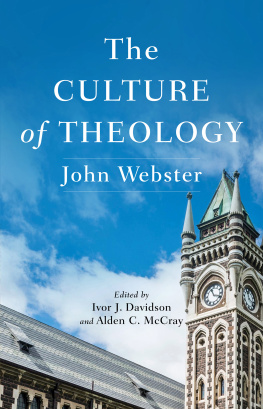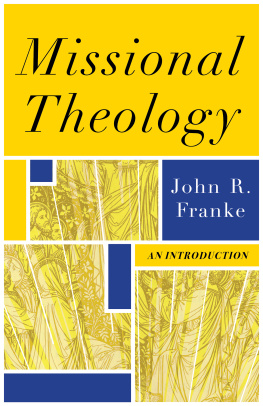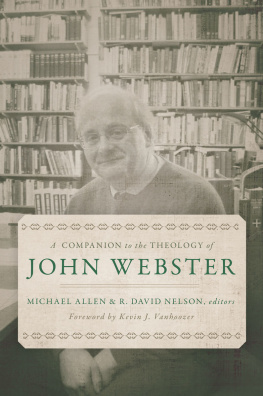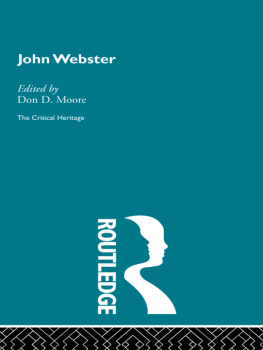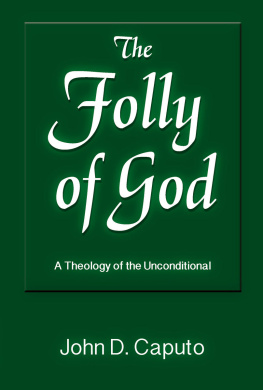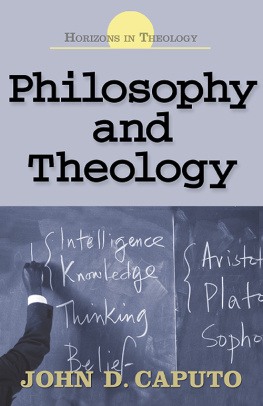Webster John - The Culture of Theology
Here you can read online Webster John - The Culture of Theology full text of the book (entire story) in english for free. Download pdf and epub, get meaning, cover and reviews about this ebook. year: 2019, publisher: Baker Academic, genre: Religion. Description of the work, (preface) as well as reviews are available. Best literature library LitArk.com created for fans of good reading and offers a wide selection of genres:
Romance novel
Science fiction
Adventure
Detective
Science
History
Home and family
Prose
Art
Politics
Computer
Non-fiction
Religion
Business
Children
Humor
Choose a favorite category and find really read worthwhile books. Enjoy immersion in the world of imagination, feel the emotions of the characters or learn something new for yourself, make an fascinating discovery.
- Book:The Culture of Theology
- Author:
- Publisher:Baker Academic
- Genre:
- Year:2019
- Rating:3 / 5
- Favourites:Add to favourites
- Your mark:
- 60
- 1
- 2
- 3
- 4
- 5
The Culture of Theology: summary, description and annotation
We offer to read an annotation, description, summary or preface (depends on what the author of the book "The Culture of Theology" wrote himself). If you haven't found the necessary information about the book — write in the comments, we will try to find it.
The Culture of Theology — read online for free the complete book (whole text) full work
Below is the text of the book, divided by pages. System saving the place of the last page read, allows you to conveniently read the book "The Culture of Theology" online for free, without having to search again every time where you left off. Put a bookmark, and you can go to the page where you finished reading at any time.
Font size:
Interval:
Bookmark:
2019 by Baker Publishing Group
Published by Baker Academic
a division of Baker Publishing Group
PO Box 6287, Grand Rapids, MI 49516-6287
www.bakeracademic.com
Ebook edition created 2019
All rights reserved. No part of this publication may be reproduced, stored in a retrieval system, or transmitted in any form or by any meansfor example, electronic, photocopy, recordingwithout the prior written permission of the publisher. The only exception is brief quotations in printed reviews.
Library of Congress Cataloging-in-Publication Data is on file at the Library of Congress, Washington, DC.
ISBN 978-1-4934-1990-6
Unless otherwise noted, Scripture quotations are from the Revised Standard Version of the Bible, copyright 1946, 1952 [2nd edition, 1971] National Council of the Churches of Christ in the United States of America. Used by permission. All rights reserved worldwide.
Scripture quotations labeled NKJV are from the New King James Version. Copyright 1982 by Thomas Nelson. Used by permission. All rights reserved.
Cover
Half Title Page
Title Page
Copyright Page
Acknowledgments
Introduction Ivor J. Davidson
1. Culture: The Shape of Theological Practice
2. Texts: Scripture, Reading, and the Rhetoric of Theology
3. Traditions: Theology and the Public Covenant
4. Conversations: Engaging Difference
5. Criticism: Revelation and Disturbance
6. Habits: Cultivating the Theologians Soul
Bibliography
Subject Index
Author Index
Cover Flaps
Back Cover
I N MOST BOOKS , authors thank those who have helped them; in this one, the others must chiefly thank the author. The editors gladly register their enduring debts to John Webster for the stimulus of his work; it has been a privilege as ever to spend time with his writing and learn from it afresh. They are grateful also to all who have facilitated their own little bit of labor: to the editors of Stimulus for gracious permission to present the text in this new form, and to Fiona Sherwin in particular for her considerable help; to Dave Nelson at Baker Publishing Group for his great enthusiasm for the project and his skill and generosity in steering it toward publication; to Melisa Blok and her colleagues for their dedicated work in the press.
Others have provided encouragement in the venture or been instruments of its possibility. Ivor Davidson is glad in particular to express gratitude to his former colleague at the University of Otago, Professor Paul Trebilco, for his vital role in the organization of the Burns Lectures back in 1998, and trusts that rereading them will rekindle memories of the very happy time we shared with John and his family in Dunedin on that occasion. Hosting these lectures together with Paul and other colleagues at Otago and elsewhere in New Zealand was a joy; extensive further discussion of the material with students over the years since has enhanced appreciation of its depths and invariably reminded of the riches they contain. May this edition extend their appeal and stimulate other fruitful conversations. Above all, may readers appropriate and apply whatever is true and wise in the vision of theology here presented, to the glory of the God of the gospel.
Alden McCray is grateful to Louise for her abiding encouragement: she has especially supported him in this project, sharing his deep gratitude for John. Ivor Davidson accomplishes nothing ever, nor could imagine doing so, but for Julie and Catriona.
Ivor J. Davidson
W HAT FOLLOWS IN THIS LITTLE VOLUME is a brief account of the nature and tasks of Christian theology. The theme absorbed its author for life; this particular expression of his thought has been a somewhat neglected jewel in his literary legacy.
John Webster was a theologians theologian. of his work in this period lacked nuance or required qualification; the underlying instincts could be expressed better, and with less risk of distortion, by bringing a number of other emphases to the fore, locating the practices of theology on a still more specific and yet grander scale. Some differences would emerge. But the argument in this text expounds a number of principles to which he remained strongly committed and presents a fundamental view of its subject from which he did not greatly depart; it gives indication of how those convictions had taken form at that stage in his career and of some of his key concerns at the time.
Though the scale of the work is relatively modest, it remains one of the fullest and most integrated examples of Websters thinking on how the practice of theology ought to be approached. He went on to write other studies that expand on several of the themes and qualify some of the investments. Those studies were envisaged as preliminary to a multivolume exposition of systematic theology in which he would set out his sense of the discipline at large, the culmination of a further two decades of reflection. His sudden death on May 25, 2016, deprived us of that: the completion of even the first part of the project was not to be. Webster thought of The Culture of Theology as a staging post; as things are, it stands as one of his more substantial endeavors to reflect holistically on the privileges, resources, and responsibilities of theological work. He considered the text inchoate: self-conscious, over-invested in the language of cultural practices, not yet clear enough on a doctrine of creation or history or on the abundance of Gods Godness as basis of Gods outer works, and thus as beginning and end of everything the theologian ever is or does. This had been an early and fairly brief venture on a vast matter; refinements were in order, and a number were adumbrated. Yet this little work sets much before us in a style that remained its authors own; in its elegance, coherence, and conceptual power it offers a magisterial short treatment of what Christian theology is all about, and what it means to take it seriously.
Webster wrote and presented the material as a series of six lectures, the Thomas Burns Memorial Lectures at the University of Otago, Dunedin, New Zealand, in mid-August 1998. The series contributed Their instruction has been relished by those in the know; it is high time for the beneficiaries to increase.
I
Websters overarching argument is quite simple. Christian theologys principal setting is not, he proposes in his opening lecture, its intellectual or social context but the world which is brought into being by the staggering good news of Jesus Christ. Christian thought and speech about God and about all things else in relation to God are features of Christian culture : they take place, first and foremost, in an eschatological space, the sphere in which Christian faith and life have their existence by the miracle of Gods grace. Christian theology flourishes when its roots in that territory are deep; it withers when its tasks are pursued in detachment from the traditions of belief and practice in which alone its work can prosper. In late modernity, the practice of theology has been inhibited not so much by outward circumstancesthe challenges posed by an intellectual, social, or political environmentas by internal disorder. All too often, theology has become dislocated from its most fundamental context; it has lost sight of the resources, responsibilities, and prospects that situation affords. Remedy lies in the reintegration of Christian theology into the true culture of Christian faiththe church, its texts and traditionsand in the deployment of genuinely theological categories in the conception and practice of theological work. Whatever their historical setting may be, theologys practitioners need to cultivate habits of mind and soul befitting those for whom the gospel itself is the most important reality.
Font size:
Interval:
Bookmark:
Similar books «The Culture of Theology»
Look at similar books to The Culture of Theology. We have selected literature similar in name and meaning in the hope of providing readers with more options to find new, interesting, not yet read works.
Discussion, reviews of the book The Culture of Theology and just readers' own opinions. Leave your comments, write what you think about the work, its meaning or the main characters. Specify what exactly you liked and what you didn't like, and why you think so.

